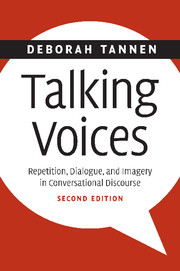Book contents
- Frontmatter
- Contents
- Acknowledgments
- 1 Introduction to first edition
- Introduction to second edition
- 2 Involvement in discourse
- 3 Repetition in conversation: toward a poetics of talk
- 4 “Oh talking voice that is so sweet”: constructing dialogue in conversation
- 5 Imagining worlds: imagery and detail in conversation and other genres
- 6 Involvement strategies in consort: literary nonfiction and political oratory
- 7 Afterword: toward a humanistic linguistics
- Appendix I: Sources of examples
- Appendix II: Transcription conventions
- Notes
- List of references
- Author index
- Subject index
5 - Imagining worlds: imagery and detail in conversation and other genres
Published online by Cambridge University Press: 23 December 2009
- Frontmatter
- Contents
- Acknowledgments
- 1 Introduction to first edition
- Introduction to second edition
- 2 Involvement in discourse
- 3 Repetition in conversation: toward a poetics of talk
- 4 “Oh talking voice that is so sweet”: constructing dialogue in conversation
- 5 Imagining worlds: imagery and detail in conversation and other genres
- 6 Involvement strategies in consort: literary nonfiction and political oratory
- 7 Afterword: toward a humanistic linguistics
- Appendix I: Sources of examples
- Appendix II: Transcription conventions
- Notes
- List of references
- Author index
- Subject index
Summary
The artist's life nourishes itself on the particular, the concrete: that came to me last night as I despaired about writing poems on the concept of the seven deadly sins and told myself to get rid of the killing idea: this must be a great work of philosophy. Start with the mat-green fungus in the pine woods yesterday: words about it, describing it, and a poem will come. Daily, simply, and then it won't lower in the distance, an untouchable object. Write about the cow, Mrs. Spaulding's heavy eyelids, the smell of vanilla flavouring in a brown bottle. That's where the magic mountains begin.
Sylvia Plath, Journals“I wish you were here to see the sweet peas coming up.”
A line of a poem? It could become one. But as it was, it was just a fragment of conversation, words uttered by a friend on one coast to a friend on the other. But these words have something in common with a poem: They spark a flash of feeling. They make us not just think about, but feel, the distance of the American continent separating two people, the longing to be in the presence of someone loved, to report not important events, but small ones, small perceptions.
“I wish you were here to see the sweet peas coming up.”
Why is this more moving than the simple, “I wish you were here”? Partly because “Wish you were here” is a fixed expression, a cliché. But mostly, I think, it is because of the sweet peas – small and ordinary and particular.
- Type
- Chapter
- Information
- Talking VoicesRepetition, Dialogue, and Imagery in Conversational Discourse, pp. 133 - 160Publisher: Cambridge University PressPrint publication year: 2007



